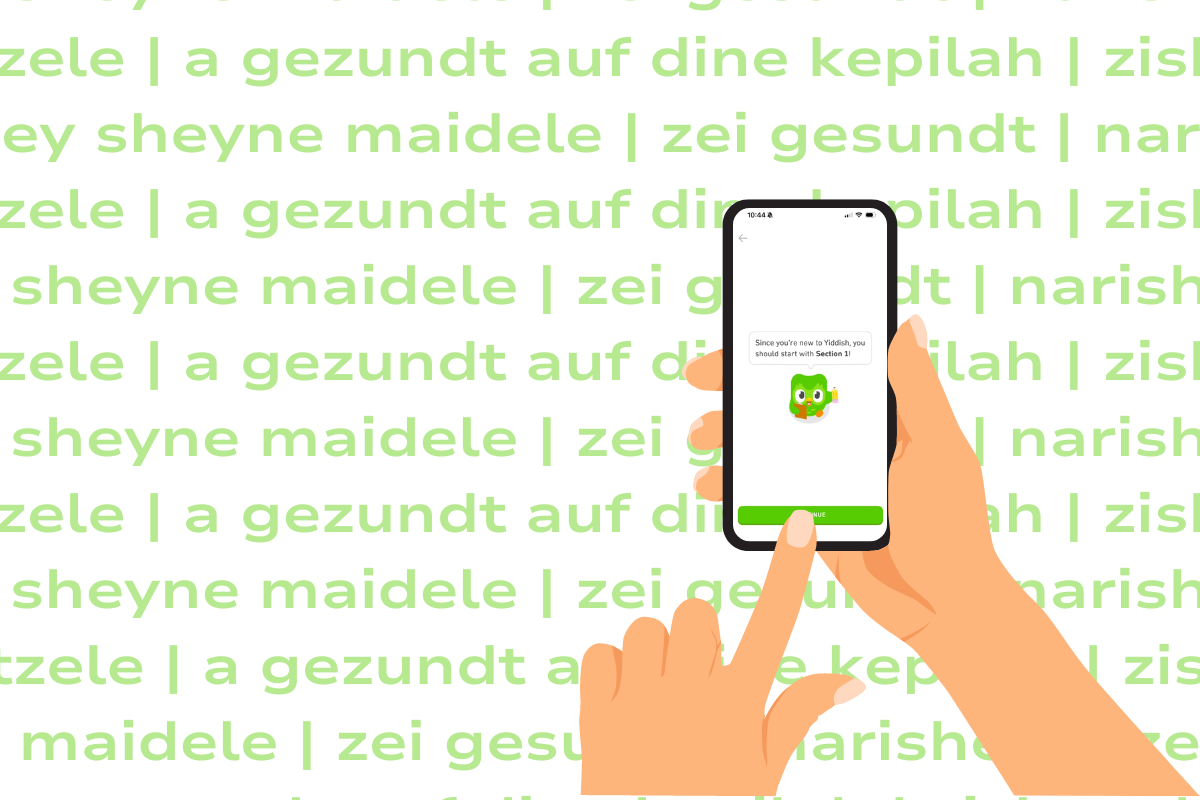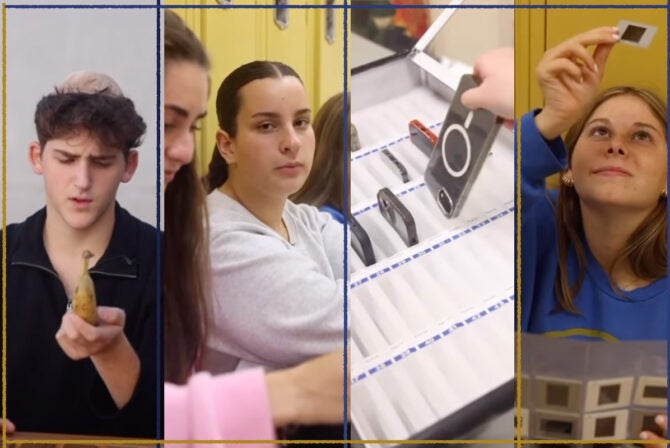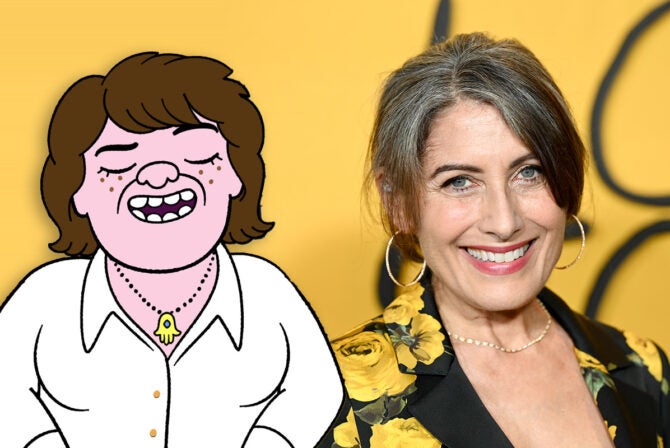You get more Jewish when your kids reach a certain age – at least, I did.
At 6, my son is a great Jew, in the sense that he questions everything with a kind of religious zeal. When he asked me, “Why are we Jewish, but not Daddy?” or “Do Jews believe in heaven?” I felt woefully ill-equipped to answer him as he deserved. Sure, I knew the basics, but this kid had some Big Questions.
Why was I so worried? I grew up in a large Conservative synagogue. Services were three hours long and I went through the motions, trying (unsuccessfully) to feel spiritual. My parents left it up to me whether I kept attending after my bat mitzvah. With characteristic teenage arrogance, I figured my education was complete and stopped going.
Just three years later, my grandparents had all died. Somehow I felt much less Jewish without them. Shabbat dinners tapered off, then vanished altogether. By my 30s, I attended High Holiday services and the occasional seder back home, but didn’t belong to a synagogue. I had become effectively secular, telling people that I was “culturally Jewish, but not observant.” I felt Jewish enjoying the Marx Brothers, “Crazy Ex-Girlfriend” and Mel Brooks. The closest I got to spirituality was hiking in the national park or practicing yoga.
I married a non-Jew, but wanted to raise our children Jewish. Perhaps it’s the idea of “l’dor v’ador,” but I couldn’t imagine breaking a centuries-deep chain. That would be like slapping my grandparents in the face. Irreligious or not, my Jewishness was a core aspect of my identity and always would be. So my son had a bris, my daughter a simchat bat and both received meaningful Hebrew names.
At 5, my son was no baby. “Why are we the only Jewish kids in our class?” he asked, frowning. Here we go, I thought.
I went into research mode, starting with Sarah Hurwitz’s “Here All Along.” She, too, had struggled to get excited about the Judaism she was raised with, and questioned whether she was “Jewish enough.” But Hurwitz argued that “pediatric Judaism” — the necessarily oversimplified version we receive as kids — sets many of us up to dismiss or abandon Judaism as adults. Thankfully, we opened to Judaism again in our mid-30s and realized it was for us.
I made up for lost time, embarking on a journey I termed my “Jewissance.” Every Friday, we lit candles and recited blessings before dinner. It was overwhelming how much I had to catch up on. Judaism doesn’t make it easy to behave ethically, but it does show why we should go to such lengths to try. We are urged to take the part and perspective of the marginalized; to recognize the power of words. We are famous for our refusal to conform, debating with passion, repairing the world. This was the Judaism I wanted my kids to know and love.
From “Jewish Literacy” to “People Love Dead Jews,” my Jewissance was all I could talk about: “Did you know…?” I’d say to my husband. Off we’d go, journeying down some Jewish rabbit hole that had ignited my curiosity: the city of Harbin, Moses Mendelssohn, Lilith, the Sanhedrin — subjects my childhood education hadn’t covered.
Some of the most intriguing topics, though, were beyond reach because I had no Yiddish. I never asked my grandparents to teach me. My parents don’t speak it, and none of the academic institutions where I’ve been a student or instructor have offered it.
When my family joined a tiny Reform temple, though, I reflexively wished everyone “Gut Shabbos.” The congregation embraced us, including the rabbi, a progressive feminist mom of three. My kids were adored, proudly opening and closing the ark. I sang with the choir, joined temple book club — got involved. Here was the Jewish community I had longed for. But after a joyful Simchat Torah, the world intruded on my honeymoon with Judaism.
Our temple received a bomb threat. I couldn’t fathom hostage posters being ripped down or college campuses hostile to Jewish students. I thought of my grandmothers’ warnings about diasporic complacency: “German Jews considered themselves more German than Jewish. Never get too comfortable.” Were we really unsafe, even here?
Respected friends and some Holocaust scholars charged Israel with genocide, while our beloved rabbi encouraged supporting the Friends of the IDF. Wading through the morass of contradictory reports, I felt untethered. Could I maintain the feelings of belonging and affinity in Judaism while interrogating the actions of the Jewish state?
As so often before, memories of my grandparents surfaced, and with them an attendant longing to connect across time and space. It was time to bring Yiddish into my life. Enter Duolingo.
Using the language app to learn Yiddish quickly offered comfort and reassurance — and Jewish joy — during a time of uncertainty. It wasn’t just the idea but the practice sentences themselves: “What, this is your wife?” “The fish, it stinks!” An entire unit called “Complaints”?! This is who we are, I thought. We bitch, we moan, we heap praise on our kids.
I delighted in teaching words and phrases to my children. “You know, Carole King is Jewish,” my son informed my mom as “Really Rosie” played for the umpteenth time. “Her real name is Carol Klein,” added my 3-year-old daughter. “Yiddish for ‘Carol Small.’”
Most gratifying of all was the chance to speak to my children as my great-great-grandmother spoke to my great-grandmother, as my grandmother spoke to my mom: with endearments, folk wisdom and admonishments unique to this beautiful and cantankerous language. “I’m a sheyne maidele,” my daughter announced proudly. “I’m trying to be a mensch, but it’s exhausting,” lamented my son. Every time I hear my ziskayt (sweetness) scold the “narishe ketzele,” (silly/foolish kitty), naches (pride) swells my heart.
So much has been lost. Despite my blistering curiosity, I will probably remain ignorant of the particulars of my ancestors’ lives. But I do have this small-but-solid thread of language, linking me to generations all but erased by history. I know they would kvell to know that the mame-loshn lives on in me.
Click here for a list of all the materials I read, watched and listened to during my “Jewissance.”








